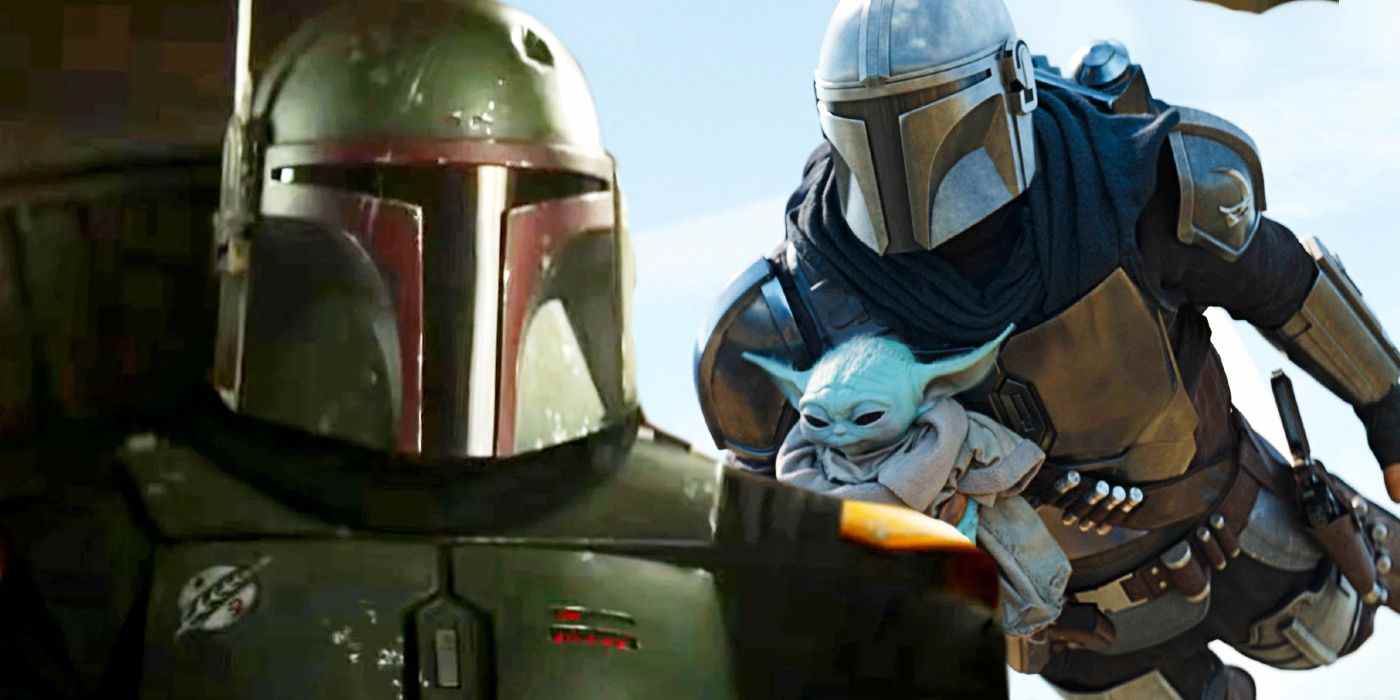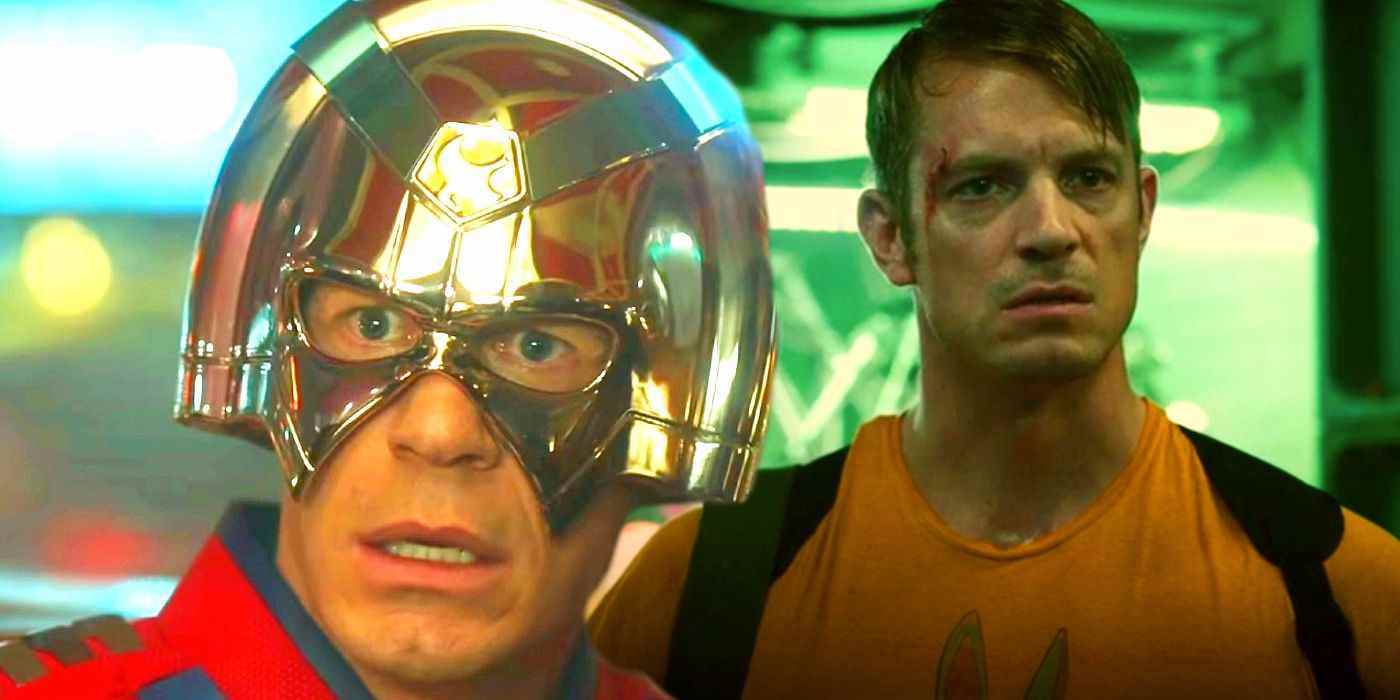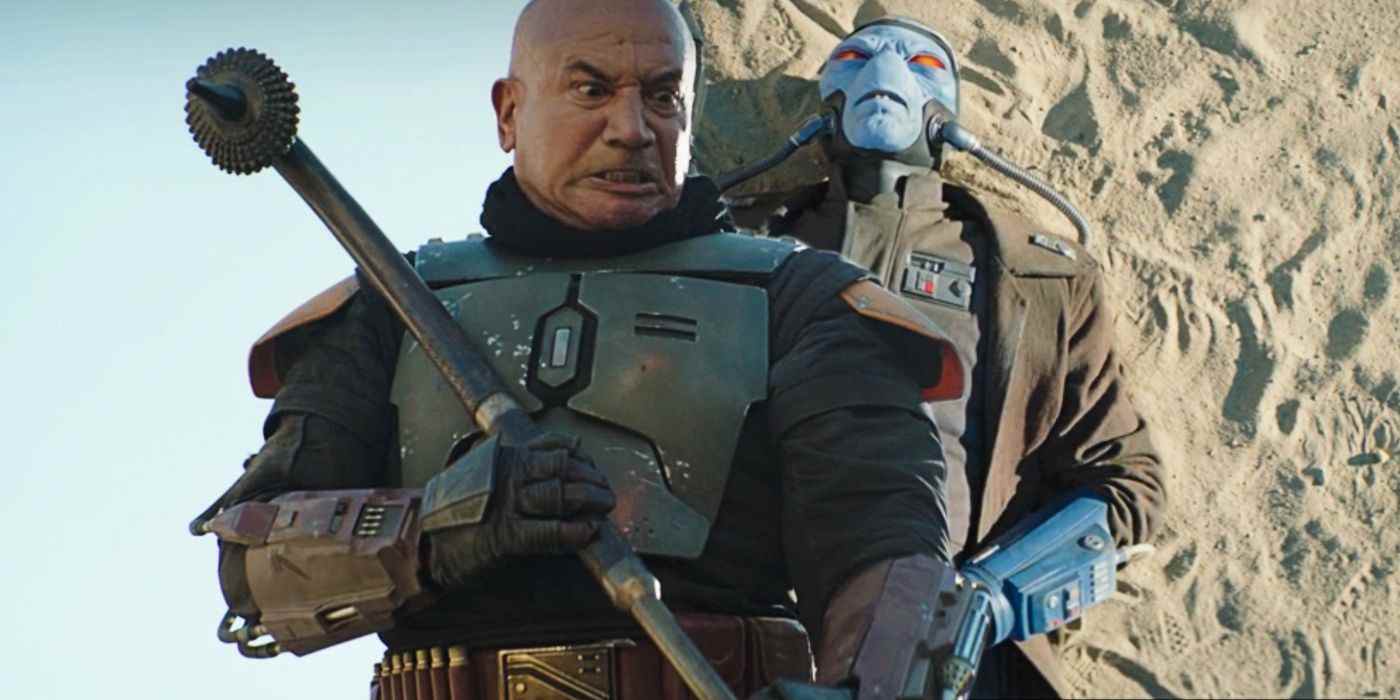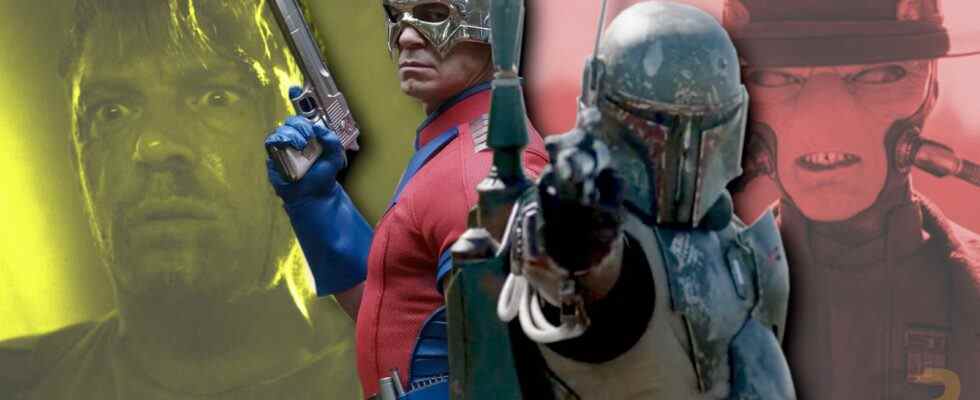The Book of Boba Fett and Peacemaker may not have a lot in common on the surface, but the two shows tried to do some similar things with their characters, only Peacemaker did a much better job. While The Book of Boba Fett is the worst-reviewed season of a live-action Star Wars show so far, while Peacemaker is one of the best-reviewed DCTV shows of all time (with way more competition).
The Book of Boba Fett and Peacemaker both feature formerly villainous side characters and send them on a journey to question their morality and role in the universe, and both shows feature a number of major Easter eggs and cameos to their respective shared universes. While Boba Fett as a character has been far more popular than Peacemaker for a long time, Peacemaker’s show saw success that made it more in-demand than The Book of Boba Fett, largely due to how much better its storytelling was handled.
While Boba Fett has had far more exposure over the years since his live-action debut in Star Wars: The Empire Strikes Back 1980, Peacemaker has been around in the comics since 1966, although he never enjoyed the same level of popularity as Boba Fett, only reaching mainstream recognition when he appeared in The Suicide Squad in 2021. This put them in a fairly similar place for their respective solo shows, but over the course of their first seasons, Peacemaker managed to do far more.

One of the biggest differences with Peacemaker and The Book of Boba Fett is their focus (or lack thereof) on the character development of their respective leads. The Book of Boba Fett’s early episodes give a lot of time to flashbacks of Boba Fett’s time with Tusken Raiders, and while that backstory has relevance for the show’s plot, there’s no clear thematic or narrative throughline to the show’s main timeline, meaning it has little more than expositional value. Making matters worse, the main timeline’s lack of urgency in introducing a clear conflict until the end of Chapter 4 obscures the character and story arcs for the entire show. Additionally, Chapters 5 and 6 abandon Boba Fett almost entirely to focus on a story that only serves to develop characters and stories relevant to season 3 of The Mandalorian, depriving that show of key context for its own story and deflating what little tension had been built for Boba Fett leading into the season finale.
Peacemaker, meanwhile, picks up after The Suicide Squad and takes a deep dive into Peacemaker’s psyche, exploring his childhood and inner turmoil over the death of Rick Flag. Peacemaker also features a number of flashbacks (to Flag’s death as well as the death of his brother), but there’s a clear purpose as Peacemaker becomes more reluctant to indiscriminately kill people. The narrative of the flashbacks and present-day stories all come to a thematic head in the show’s finale, taking Peacemaker on a clear journey started in The Suicide Squad, questioning his core themes and transforming his perspective over the course of Peacemaker‘s 8 episodes.
Peacemaker also introduced its actual villains far earlier than The Book of Boba Fett, giving them their own character arcs to contrast against Peacemaker. Both the Butterflies and Peacemaker’s dad, White Dragon, were subplots established in the first few episodes and relate directly to Peacemaker’s core conflict, resolving the White Dragon conflict in the penultimate episode and the Butterflies in the finale, threading his backstory and Rick Flag’s death into both plots. Meanwhile, The Book of Boba Fett didn’t have a clear villain established until the Pykes were finally identified in Chapter 4 before the show took a total detour away from that plot and introduces Cad Bane at the very end of Chapter 6, only to kill him off in the finale, minimizing his impact as a foil to Boba Fett.

The Book of Boba Fett was full of Star Wars Easter eggs, naturally, being part of the Star Wars universe, but on several occasions the references or tie-ins were jarring and the reason for their inclusion in the plot wasn’t clear outside of the fact that the show was capitalizing on its connection to The Mandalorian and larger Star Wars canon. This was most apparent with Chapter 5 and 6 abandoning Boba Fett to focus on Din Djarin, Grogu, and Luke Skywalker, including a major sequence where Din Djarin helps rebuild an N1 Starfighter on Tatooine and flies through part of the Podracing course in some majorly on-the-nose Easter eggs.
Peacemaker, meanwhile, was full of subtle Easter eggs and name drops, but they were rarely at the expense of the plot or story at hand. There was a major running joke where Peacemaker would reveal some offensive conspiracy theories about members of the Justice League he’d read on suspicious internet forums, culminating in an actual appearance from four Justice League members (with cameos by Ezra Miller and Jason Momoa) in the finale to capitalize on Peacemaker’s reference to a conspiracy that Aquaman “f*cks fish.” The cameos are all major movie characters (even if Superman and Wonder Woman were only in silhouette, but also avoids distracting from the main plot or undercutting the character arcs of the main characters as it would have if the Justice League had zoomed in to save the day in some sort of deus ex machina.

The Book of Boba Fett and Peacemaker are both shows that attempt to take a character with a complicated, usually darker, morality and send them on a journey to recontextualize their alignment, but Peacemaker‘s approach is far more successful because it’s actually honest about its characters’ history and morality, while The Book of Boba Fett ignores Boba Fett’s villainous past. It’s implied that Boba Fett’s character shift occurs during the flashback with the Tuskens Raiders, but since he’s never portrayed as a villain, the character seems to be the same both before and after his time with the Tuskens. Ignoring Boba Fett’s past means the show never actually grapples with this moral shift, essentially nullifying its significance as a character arc as there’s no clear starting point, struggle, catalyst, or resolution to this transformation to the story.
When Boba faces Cad Bane in the final episode, Boba says “this is my city, these are my people, I will not abandon them,” despite never explaining why he believes any of those things. Bane taunts Boba over the fact that he’s a quicker draw, which would typically be the right place for Boba to include a moral declaration to contrast Bane’s implied “might vs right” morality, but the former bounty hunter’s response is simply“I have armor,” which seems to be a complete concession to long-held Boba Fett criticism that he’s only an interesting character because of his “cool armor.” Boba defeats Bane with his Tusken gaderffii, which should contrast against his “old ways” concluding his character arc with him embracing his newfound morality or changed perspective from his time with the Tuskens, but that’s not what happens. Instead, it’s his armor that saves him after all, and there’s no reason why he had to use the gaderffii instead of any other weapon in his arsenal. Boba Fett won the day because of the things that have always defined him as a character (his armor), not because of anything that happened to him during the course of the show.
Conversely, Peacemaker’s moral conflict ultimately culminates with the Butterflies appealing to Peacemaker’s core paradoxical ends-justifies-the-means perspective on peace: “save your people and your world no matter how many lives it costs us… fulfill your calling. Be the Peacemaker.” Flashing back to his troubled childhood and the death of Rick Flag in The Suicide Squad brings his arc to an inflection point where he has to make a decision about the “joke” of saving the world no matter how many lives it costs, leading to his ultimate decision to stop the Butterflies so humanity can be free to make their own choices, even if it might not lead to peace. His upbringing and the death of his brother, the death of Rick Flag, and his experiences with his team throughout the show all come to a head with a decision directly tied to his character arc in both The Suicide Squad and Peacemaker, bringing about a truly transformative point in his arc.

Peacemaker comes hot off the heels of The Suicide Squad where Peacemaker’s character arc was defined by him killing Rick Flag, the only truly morally right character in the whole movie, to prevent him from exposing the twisted human experiments the US government had been conducting with the captured alien, Starro, in Corto Maltese, arguably the only morally pure decision in the movie, prompting Flag’s final words “Peacemaker, what a joke,” a phrase that haunts Peacemaker throughout his character arc on the show. He’s clearly conflicted over his paradoxical moral compass with repeated flashbacks to his killing of Flag as well as his tortured upbringing and being crafted into a killer by his racist supervillain father.
The fact that Peacemaker’s past actions were unquestionably wrong is core to his story, with Amanda Waller setting him up as a patsy for Project Butterfly, planting a fake diary in his house so he can take the fall for the operation to insulate her and the other A.R.G.U.S. team members when it’s all said and done. Even the characters on the show with the purest moral compass are compromised, with Economos falsifying evidence to frame Peacemaker’s dad, Harcourt killing a security guard as he begs for his life just to tie up loose ends, Adebayo for planting the diary to frame Peacemaker, or Murn for taking over the body of a human or replacing the police chief to hinder the police from doing their job. Even the police, while far less morally gray than the other characters, cross a line when Detective Song uses her family connection with a judge to get a search warrant.
Peacemaker’s moral conflict ultimately culminates with Goff, now in Detective Song’s body, appealing to Peacemaker’s paradoxical ends-justifies-the-means perspective on peace, asking him to help them so they could “save your people and your world no matter how many lives it costs us… fulfill your calling. Be the Peacemaker.” Flashing back to his troubled childhood and the death of Rick Flag brings his arc to an inflection point where he has to make a decision about the “joke” of saving the world no matter how many lives it costs, leading to his ultimate decision to stop the Butterflies so humanity can be free to make their own choices, even if it might not lead to peace. The arc takes him on a proper journey from his villainous turn in The Suicide Squad through a series of complicated moral conflicts (including killing his racist supervillain dad), culminating with him making a decision that is a clear thematic inverse from the decision he made in The Suicide Squad.
The way The Book of Boba Fett keeps the character’s more villainous past at arm’s length doesn’t only deprive the story of a proper character arc, but also continues a concerning trend in Star Wars trend in its recontextualization of its villains, such as describing Darth Vader as a “anti-hero” and suggesting he wasn’t as fully consumed by the dark side as previously portrayed, reducing Anakin Skywalker’s arc in the original six Star Wars movies. Additionally, the near-complete erasure of Anakin’s redemption from Disney’s sequel trilogy narrative, despite strong parallels to Ben Solo’s arc makes the nine movie Skywalker Saga less than the sum of its parts, whereas Lucas’ two trilogies only elevated each other thematically.
Despite being completely different genres and tones, Peacemaker and The Book of Boba Fett tell stories that tie into a larger universe and transform the morality of formerly villainous side characters. Unfortunately, The Book of Boba Fett gets distracted by its Star Wars connections and fails to develop its story and characters, but Peacemaker excels in all these areas. While The Book of Boba Fett makes one of Star Wars’ most iconic characters seem less interesting, Peacemaker takes one of the more obscure characters in DC Comics and turns his story into one of the best-reviewed DC shows and one of HBO Max’s biggest hits.
